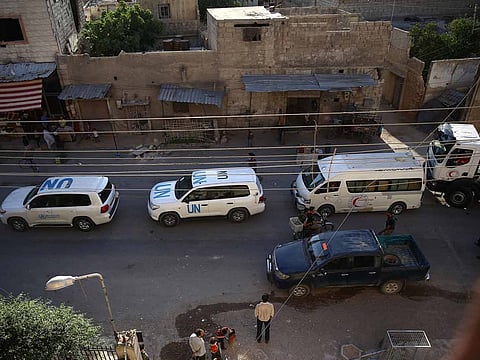Damascus to form new government before end of Ramadan
New government will be pro-regime as Russia and Iran do not feel need to share power with opposition

Damascus: Syria is supposed to be getting a new government before the end of Ramadan. This is the constitutional process after a new parliament was sworn in this month.
Contrary to high expectations that accompanied start of the Syrian negotiations in Geneva last January, the new government will not be a transitional one, and it won’t include members of the Syrian Opposition.
Because the UN-mandated Syria talks failed, neither Damascus nor Tehran or Moscow are in the mood to share power with the opposition — at least not yet — and will unilaterally create a cabinet packed with hardliners and Baathists.
During the Geneva talks, top Syrian negotiator Bashar Al Jaafary said that his country was willing to share power with the opposition, echoing a statement made earlier to Russian media by President Bashar Al Assad.
There was no specification on what this power sharing would include, and whether it would be cohesive or restricted to ceremonial posts. The Syrian Opposition after all is divided into major sub-groups: regime-friendly/Russian backed, regime-created/Iranian backed and, of course, hose backed and funded by the Saudis, Qataris, and Turks. Damascus has repeatedly re-affirmed that it will never share power with the Riyadh-backed opposition, which is currently headed by ex-Prime Minister Riad Hijab.
Speaking to Gulf News on condition of anonymity, a senior source in the Syrian Government affirmed that four names are currently on the table in the upper echelons of power, earmarked for the Syrian premiership. The first is Wael Halaki, the incumbent premier who has held the job since the summer of 2012. A native of Daraa in the Syrian south, he is a medical doctor by training who previously served as health minister and took over as premier after defection of his predecessor, Riad Hijab, four years ago. Some voices are proposing keeping him in power — despite major charges of corruption — arguing that this would be wiser for now if Damascus is forced to pick a new premier, with Russian backing, once the talks resume in Switzerland and a deal is reached between the Americans and the US.
To avoid the hassle of appointing two premiers within a six-month interval, it would be best for Halaki to stay and simply reshuffle his current cabinet.
The appointment of Hadiya Al Abbas, a Baathist woman from Deir Al Zor, as speaker of Parliament this June, might reduce Halaki’s chances of remaining in power. An unspoken “rule” presides in Damascus since the early 1970s, calling for proper representation of Damascus in top government posts and equal division between them and natives of other Syrian provinces. When the premiership was held by a Damascene back in the 1980s, for example, a native of Houran in the Syrian south took over parliament, yet when a Damascene made it to the speakership of the Syrian Chamber, a Hourani was automatically inserted into the premiership. With only one exception in 1980-1987, the speakership of parliament was always held by Damascus, and giving it now to Deir Al Zour means that the new Syrian Prime Minister has to be a native of Damascus.
The three Damascenes earmarked for the job are Ammar Saati, 49, head of the Student’s Union who serves on the powerful Baath Party Regional Command; Nabeel Tomeh, 59, a wealthy businessman and television producer; and Imad Khamis, 55, the current Minister of Electricity. The first is close to the Al Assads and single-handedly muzzled all university campuses in Syria, earning him wide acclaim within the Baath Party. More recently he was in charge of administering the country’s parliamentary elections last April.
Tomeh, a political independent, is a relative newcomer to the political scene, voted into the Syrian Parliament last April. He made a fortune working in Germany back in the 1980s.
Khamis, a bureaucrat, is actually a native of rural Damascus but is admired for bringing electricity to different cities and towns, despite non-stop attacks from Syrian rebels on power plants throughout the country since 2012. He, too, is a ranking member of the Baath Party.



